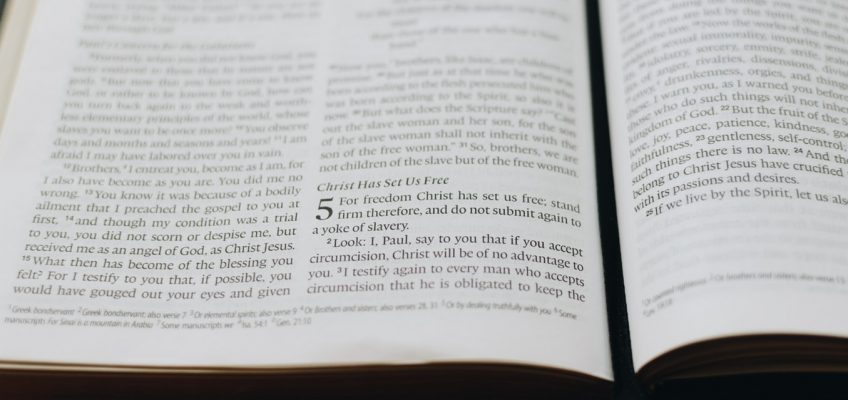On September 30, 2019, Pope Francis declared in an apostolic letter that “the Third Sunday in Ordinary Time is to be devoted to the celebration, study and dissemination of the Word of God” (Aperuit Illis, 3). This letter and the establishment of a Sunday to focus on God’s word has the potential to renew our parish communities.
To understand why this change is important, we have to recall two previous church teachings about the word of God.
At the Second Vatican Council, the bishops wanted to say something about who God is and how we know who God is. In its document on divine revelation, Dei Verbum, the Second Vatican Council said that we know who God is because God enters into a relationship with us. Instead of learning facts about God, the council challenged us to know God. God takes the initiative to enter into a personal, loving relationship with us. It is through that encounter that we come to know who God is.
The way that God enters into that personal, loving relationship with us is through the gift of God’s word.
What is the “Word” of God?
“Word” means a lot in this context. Pope Benedict VXI wrote about all the different ways we understand the “symphony of the word” (see Verbum Domini):
- Logos—the cosmic dimension of God’s word
- Creation—God’s word as the enactment of the divine image
- Reality—”The word of God makes us change our concept of realism: the realist is the one who recognizes in the word of God the foundation of all things” (Verbum Domini, 10)
- Christ—”[Jesus’s] unique and singular history is the definitive word which God speaks to humanity” (Verbum Domini, 11)
- Ultimate destiny—the culmination of revelation and the fulfillment of all God’s promises in Jesus Christ
- Tradition and scripture—”The word of God is given to us in sacred Scripture as an inspired testimony to revelation; together with the Church’s living Tradition, it constitutes the supreme rule of faith” (Verbum Domini, 18)
If you think about all the ways God shows up in our lives, it’s a bit overwhelming. God, it seems, is seriously trying to get our attention.
Pope Francis wants us to have a deeper encounter with the living Christ, through scripture, so that we will become a church and a people committed to mercy. Share on XWhy take scripture so seriously?
Pope Francis, in his letter, is focusing on just one of the meanings of “word”—scripture: “The relationship between the Risen Lord, the community of believers and sacred Scripture is essential to our identity as Christians” (1). That doesn’t mean he is leaving out all the other meanings. But it is impossible to ever fully realize or define God’s word. Pope Francis quotes St. Ephrem:
Who is able to understand, Lord, all the richness of even one of your words? There is more that eludes us than what we can understand. We are like the thirsty drinking from a fountain. Your word has as many aspects as the perspectives of those who study it. The Lord has colored his word with diverse beauties, so that those who study it can contemplate what stirs them. He has hidden in his word all treasures, so that each of us may find a richness in what he or she contemplates (Commentary on the Diatessaron, 1, 18).
The reason we need to take this seriously is not so that we will become better scripture scholars. Pope Francis wants us to have a deeper encounter with the living Christ, through scripture, so that we will become a church and a people committed to mercy.
To listen to sacred Scripture and then to practice mercy: this is the great challenge before us in life. God’s word has the power to open our eyes and to enable us to renounce a stifling and barren individualism and instead to embark on a new path of sharing and solidarity. (13)
How to renew your community through scripture
In order to follow Pope Francis’s decree and to renew our communities with an emphasis on scripture, here are some practical suggestions.
Pastors and pastoral leaders
- Read Dei Verbum, the Second Vatican Council’s dogmatic constitution on divine revelation
- Read Verbum Domini, Pope Benedict XVI’s apostolic exhortation that deals with how we should approach the Bible
- Read Pope Francis’s letter, Aperuit Illis
Homilists
- Reflect on Pope Francis’s instruction to preachers in Evangelii Gaudium, 142
- Give your homilies “a quasi-sacramental character”
Lectors and gospel readers
- Practice, practice, practice. Find the one message your reading is meant to communicate, and proclaim that message clearly
- Every Advent, read the complete gospel that is assigned for that year
- In Year B, which is Mark, the shortest gospel, also read John
Liturgy planners
- Read Pope Francis’s letter, Aperuit Illis
- On the Third Sunday in Ordinary Time, enthrone the sacred text
- Bless or commission the lectors of the parish
- Provide training for the parish lectors
- Be sure that the responsorial psalm is always sung from the ambo
- Provide a Bible or a gospel book or a daily reading resource such as Give Us This Day to the members of the parish
Catechists
- Read Pope Francis’s letter, Aperuit Illis
- Teach parishioners the practice of lectio divina
- Lead small groups in mystagogical reflection on the Sunday readings
See also these related articles:
- God gives us one another
- Boundless mercy
- Be last to be first
- Near enough
- In the midst of the tempest
- “Heal the wounds”
- Where all can thrive
- Holy Ground
- Restraint and Generosity
- Bulletin Shorts for the Twenty-Seventh Sunday in Ordinary Time
Image credit: Kelly Sikkema, Unsplash



Leave a Reply